必修一 Unit5 Language Around The World_Listening and Speaking 课件
文档属性
| 名称 | 必修一 Unit5 Language Around The World_Listening and Speaking 课件 | 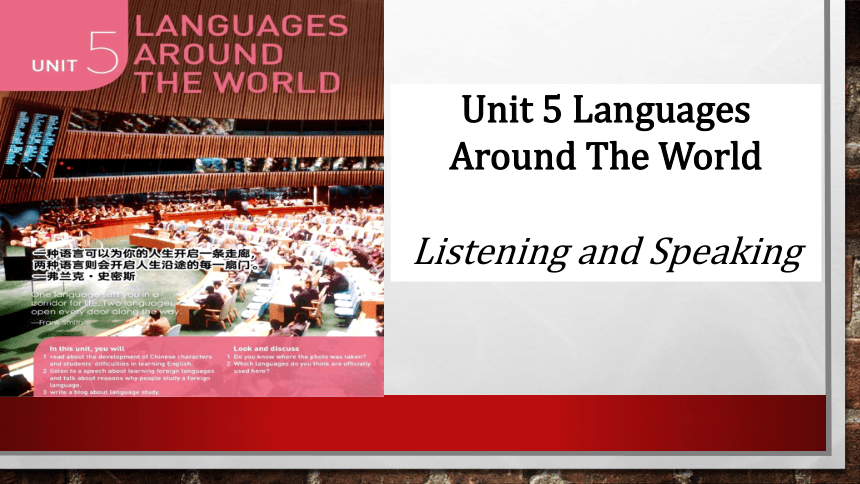 | |
| 格式 | pptx | ||
| 文件大小 | 38.6MB | ||
| 资源类型 | 试卷 | ||
| 版本资源 | 人教版(2019) | ||
| 科目 | 英语 | ||
| 更新时间 | 2024-11-16 15:17:05 | ||
图片预览



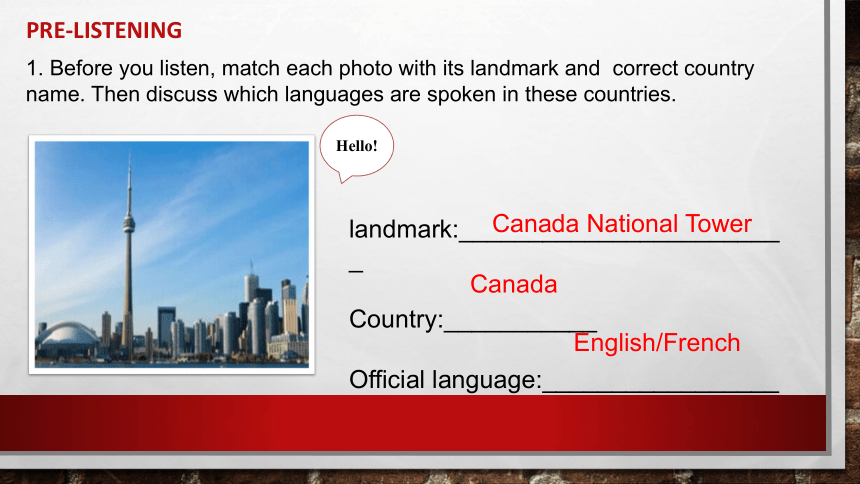
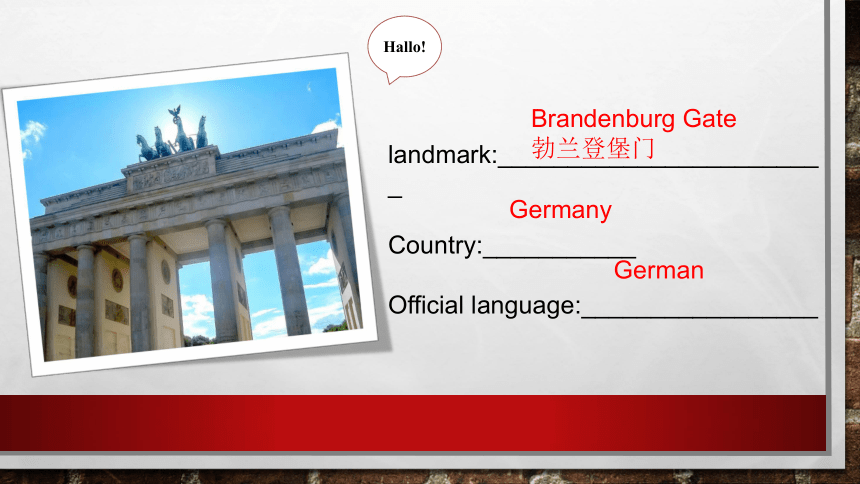
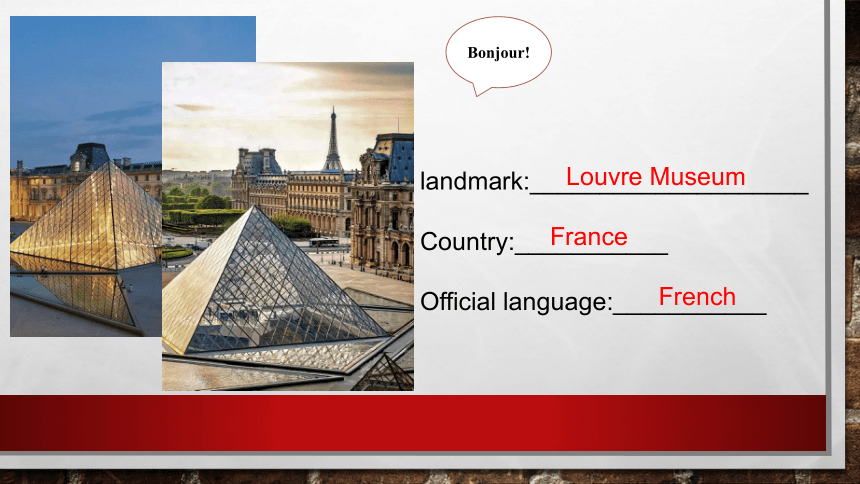


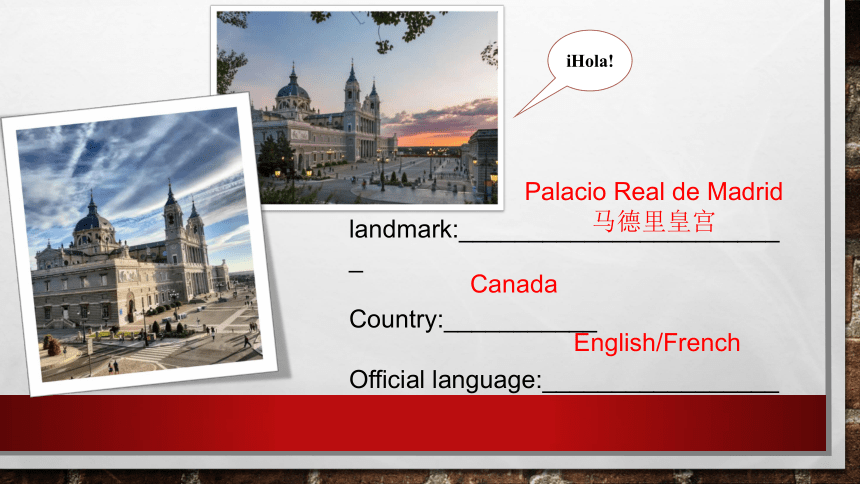
文档简介
(共25张PPT)
Unit 5 Languages Around The World
Listening and Speaking
Do you know how to say “你好” in different languages
pre-listening
1. Before you listen, match each photo with its landmark and correct country name. Then discuss which languages are spoken in these countries.
Hello!
landmark:________________________
Country:___________
Official language:_________________
Canada
English/French
Canada National Tower
Hallo!
landmark:________________________
Country:___________
Official language:_________________
Germany
German
Brandenburg Gate
勃兰登堡门
Bonjour!
landmark:____________________
Country:___________
Official language:___________
France
French
Louvre Museum
landmark:_______________
Country:___________
Official language:__________
Russia
Russian
Red Square
здравствуйте!
landmark:_____________
Country:_______
Official language:_________
India
Indian
Taj Mahal
!
iHola!
landmark:________________________
Country:___________
Official language:_________________
Canada
English/French
Palacio Real de Madrid
马德里皇宫
while-listening
2. Listen to a speech and tick two languages with the most native speakers.
Circle the official languages of the United Nations.
Russian
Spanish
Chinese
Arabic
Korean
English
Japanese
French
√
√
3. Listen to the speech again and answer the questions.
while-listening
① What is the main topic of this speech
② How many languages are there in the world
Learning a foreign language.
There are nearly 7,000 languages in the world.
3. Listen to the speech again and answer the questions.
while-listening
③How many billion people speak the UN’s official languages as their native or second language
④ What is the attitude of the speaker towards foreign language learning
About 2.8 billion people.
It’s very useful to learn one or more foreign languages..
4. Listen to the speech again. What do the italicized words refer to in the sentences
while-listening
① They think it means better job chances in the future.
② They are spoken by around 2.8 billion people…
Reference
Pronounces (it, they, she, etc.) refer to something or somebody mentioned earlier. Pay attention to the context of words to help you understand what the pronouns refer to.
Students who choose to study a UN language.
Studying a UN language.
The six official UN languages.
听力文稿:
To some students,it seems that the only foreign language to learn is English. There are,however, nearly 7,000 languages in the world. After Chinese,the language with the most native language speakers isn’t English—it’s Spanish! Learning English is very useful, but it is wise to learn at least one other foreign language, if possible. There are many reasons why people learn a foreign language. Many students choose to study one of the languages that are spoken at the UN,as they think it means better job chances in the future. The UN has six official languages:Arabic,Chinese,English,French,Russian,and Spanish.
听力文稿:
They are spoken by around 2.8 billion people as their native or second languages. Some students,though,choose to study a language because of family or friends. One American girl chose to learn Danish because her grandparents were from Denmark. When she was little, her grandpa used to read letters to her in Danish from their relatives in Denmark. Another young lady started learning French because she had several friends from African countries where French is spoken. What do you think Which other language would you choose to study and why
after-listening
5. Work in pairs or groups. Discuss which other language(s) you want to learn and why.
My father is doing business with Russians. I’d like to help him in the future.
I like watching Japanese cartoons, so I’d like to learn Japanese.
Perhaps I should study French. I think it sounds beautiful, and I know it’s used in many countries.
example
A: What language do you want to study
B: I really want to study French. I think that the French language sounds beautiful.
A: Why Do you want to go to France some day
B: Yes, I’d love to. Also, French is used by many international organizations around the world. Do you know that FIFA’s full name is in French
A: Oh, I remember that. But I don’t know how to pronounce it.
FIFA: Fédération Internationale de Football Association
(International Federation of Association Football)国际足联
pronunciation
6. Work in pair. Read the words to each other and see if you pronounce them differently.
schedule hostile either address
direct laboratory advertisement shone
pronunciation
7. Listen and pay attention to how the speakers pronounce them.
schedule
hostile
either
address
direct
laboratory
advertisement
shone
[′ edju:l] [′sked ul]
[′h sta l] [′hɑstl]
[′a (r)] [′i ]
[ ′dres] [′ dres]
[ n] [ on]
BrE. AmE.
[da ′rekt] [d ′r kt]
[l ′b r tri] [′l br t ri]
[ d′v :t sm nt] [ dv r′ta zm nt]
American
accent
Australian accent
South American
accent
British
accent
the least difficult
the most difficult
VS
American
British
Can you tell the difference between American accent and British accent
pronunciation
8. Listen to the paragraph read by two different speakers. Which speaker has a British accent and which has an American accent.
English is a crazy language. There is no egg in eggplant nor ham in hamburger; neither apple nor pine in pineapple. English muffins weren't invented in England or French fries in France. Sweetmeats are candies while sweetbreads, which aren't sweet, are meat.... We find that quicksand can work slowly, boxing rings are square, and a guinea pig is neither from Guinea nor is it a pig. And why is it that writers write but ... hammers don't ham (Richard Lederer)
The woman: British accent. The man: American accent.
pine n.
muffin n.
sweetmeat. n.
sweetbread n.
quicksand n.
boxing rings
guinea n.
guinea pig
hammer
ham
松树
松饼
糖果; 甜食; 蜜饯
(从小羊或小牛身上取下供食用的)胰脏
流沙
拳击台
几尼(英国旧币)
豚鼠
锤子
火腿
language points in this part
Unit 5 Languages Around The World
Listening and Speaking
Do you know how to say “你好” in different languages
pre-listening
1. Before you listen, match each photo with its landmark and correct country name. Then discuss which languages are spoken in these countries.
Hello!
landmark:________________________
Country:___________
Official language:_________________
Canada
English/French
Canada National Tower
Hallo!
landmark:________________________
Country:___________
Official language:_________________
Germany
German
Brandenburg Gate
勃兰登堡门
Bonjour!
landmark:____________________
Country:___________
Official language:___________
France
French
Louvre Museum
landmark:_______________
Country:___________
Official language:__________
Russia
Russian
Red Square
здравствуйте!
landmark:_____________
Country:_______
Official language:_________
India
Indian
Taj Mahal
!
iHola!
landmark:________________________
Country:___________
Official language:_________________
Canada
English/French
Palacio Real de Madrid
马德里皇宫
while-listening
2. Listen to a speech and tick two languages with the most native speakers.
Circle the official languages of the United Nations.
Russian
Spanish
Chinese
Arabic
Korean
English
Japanese
French
√
√
3. Listen to the speech again and answer the questions.
while-listening
① What is the main topic of this speech
② How many languages are there in the world
Learning a foreign language.
There are nearly 7,000 languages in the world.
3. Listen to the speech again and answer the questions.
while-listening
③How many billion people speak the UN’s official languages as their native or second language
④ What is the attitude of the speaker towards foreign language learning
About 2.8 billion people.
It’s very useful to learn one or more foreign languages..
4. Listen to the speech again. What do the italicized words refer to in the sentences
while-listening
① They think it means better job chances in the future.
② They are spoken by around 2.8 billion people…
Reference
Pronounces (it, they, she, etc.) refer to something or somebody mentioned earlier. Pay attention to the context of words to help you understand what the pronouns refer to.
Students who choose to study a UN language.
Studying a UN language.
The six official UN languages.
听力文稿:
To some students,it seems that the only foreign language to learn is English. There are,however, nearly 7,000 languages in the world. After Chinese,the language with the most native language speakers isn’t English—it’s Spanish! Learning English is very useful, but it is wise to learn at least one other foreign language, if possible. There are many reasons why people learn a foreign language. Many students choose to study one of the languages that are spoken at the UN,as they think it means better job chances in the future. The UN has six official languages:Arabic,Chinese,English,French,Russian,and Spanish.
听力文稿:
They are spoken by around 2.8 billion people as their native or second languages. Some students,though,choose to study a language because of family or friends. One American girl chose to learn Danish because her grandparents were from Denmark. When she was little, her grandpa used to read letters to her in Danish from their relatives in Denmark. Another young lady started learning French because she had several friends from African countries where French is spoken. What do you think Which other language would you choose to study and why
after-listening
5. Work in pairs or groups. Discuss which other language(s) you want to learn and why.
My father is doing business with Russians. I’d like to help him in the future.
I like watching Japanese cartoons, so I’d like to learn Japanese.
Perhaps I should study French. I think it sounds beautiful, and I know it’s used in many countries.
example
A: What language do you want to study
B: I really want to study French. I think that the French language sounds beautiful.
A: Why Do you want to go to France some day
B: Yes, I’d love to. Also, French is used by many international organizations around the world. Do you know that FIFA’s full name is in French
A: Oh, I remember that. But I don’t know how to pronounce it.
FIFA: Fédération Internationale de Football Association
(International Federation of Association Football)国际足联
pronunciation
6. Work in pair. Read the words to each other and see if you pronounce them differently.
schedule hostile either address
direct laboratory advertisement shone
pronunciation
7. Listen and pay attention to how the speakers pronounce them.
schedule
hostile
either
address
direct
laboratory
advertisement
shone
[′ edju:l] [′sked ul]
[′h sta l] [′hɑstl]
[′a (r)] [′i ]
[ ′dres] [′ dres]
[ n] [ on]
BrE. AmE.
[da ′rekt] [d ′r kt]
[l ′b r tri] [′l br t ri]
[ d′v :t sm nt] [ dv r′ta zm nt]
American
accent
Australian accent
South American
accent
British
accent
the least difficult
the most difficult
VS
American
British
Can you tell the difference between American accent and British accent
pronunciation
8. Listen to the paragraph read by two different speakers. Which speaker has a British accent and which has an American accent.
English is a crazy language. There is no egg in eggplant nor ham in hamburger; neither apple nor pine in pineapple. English muffins weren't invented in England or French fries in France. Sweetmeats are candies while sweetbreads, which aren't sweet, are meat.... We find that quicksand can work slowly, boxing rings are square, and a guinea pig is neither from Guinea nor is it a pig. And why is it that writers write but ... hammers don't ham (Richard Lederer)
The woman: British accent. The man: American accent.
pine n.
muffin n.
sweetmeat. n.
sweetbread n.
quicksand n.
boxing rings
guinea n.
guinea pig
hammer
ham
松树
松饼
糖果; 甜食; 蜜饯
(从小羊或小牛身上取下供食用的)胰脏
流沙
拳击台
几尼(英国旧币)
豚鼠
锤子
火腿
language points in this part
